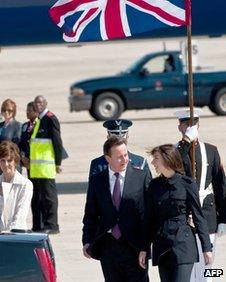Obama and Cameron seek a way forward in Afghanistan
- Published
- comments

Mr Obama ran on an anti-war platform in 2008 and has faced criticism for his war strategy
Barack Obama and David Cameron say their relationship is "essential".
The essence of the ties between the US and UK is the military relationship, and no subject is hotter right now than Afghanistan and the issue of when the war ends for the allies.
The two men, meeting in Washington this week, want to make sure they are on the same page ahead of the Nato meeting in Chicago in May.
The British were briefly shocked when the US Defence Secretary Leon Panetta appeared to tweak the timetable earlier in the year.
But today Mr Obama has said "we have a strategy that will allow us to responsibly wind down this war".
"Already we're scheduled to remove 23,000 [troops] by the end of this summer, following the 10,000 that we withdrew last year."
You may notice he did not go into the plans for next year.
Anti-war candidate
Mr Cameron may welcome a quicker drawdown. He just doesn't want to read about it in the newspapers. British Ambassador Sir Peter Westmacott says there "needs to be transparency, no surprises", external.
But there are pressures on the president.
When I travel around the US talking to disillusioned Democrats in this election year there is one presidential achievement they always praise: ending the wars, bringing the troops home.
If there is one thing that pleases them more than what has been done already, it is any sign that the remaining troops will come home quicker.
Don't forget that Mr Obama was elected on an anti-war ticket. It was a critical part of his appeal. So you can see why the White House might be toying with the idea of bring more troops home more quickly, as the New York Times suggests, external.
Remember, many supporters were seriously disappointed in 2009 when Mr Obama announced he was sending more troops to Afghanistan.
It was the very opposite of what they wanted. But as a new president accused of being soft on national security, he had little alternative.
No president could turn his back and allow another attack on America to be launched from that country.
Counter-insurgency dream
But his solution had a strict time limit. It seemed as if, after months of debate, he had been converted to the military's favourite doctrine of the moment, counter-insurgency.
That's an academic name for the old concept of winning hearts and minds, external. Mr Obama gave it just two years to work. That was either breathtakingly cynical or astonishingly optimistic.

British officials say there needs to be transparency on the war's future
A victory for the counter-insurgency doctrine would look something like this:
the US and Afghan governments would be working hand-in-glove
the Afghan people would see the Americans not as occupiers but as the people who brought them peace and security, not to mention electricity, roads, clean water and a corruption-free government
the Taliban would be licked militarily but - more importantly - they would strike no chord with the majority of Afghans.
That is not quite the real picture. Instead the Afghan government is a fractious partner, the Americans are seen by many as a provocative problem and the Taliban are poised to return to power in some form, external.
On the other hand Osama Bin Laden is dead, al-Qaeda are more likely to operate out of Yemen and Pakistan and the president says their leadership has been devastated.
So will the current timetable hold? The overall plan will, but I would not be surprised if Mr Obama and Mr Cameron agree to more troops leaving next year, more quickly.
Over the next few days the discussion might get wonky, with numbers and dates being thrown around. Soon someone will write about it being too hot or too cold for the fighting season. That's all detail.
The real argument is a moral one. Those putting pressure on Mr Obama will argue that even if he can't say it openly, this war has been lost.
The American people - 60% of them - don't think it was worth fighting. They will ask why young Britons and Americans are still fighting and dying, and for what cause.
Some in Whitehall and some in the Pentagon will answer that the fight is for an Afghanistan secure enough to ensure that al-Qaeda will not return.
But for a president who says he has a "deeply held preference for peace over war", who talks movingly of the agony of sending people into battle, that may not be a good enough answer.
- Published13 March 2012